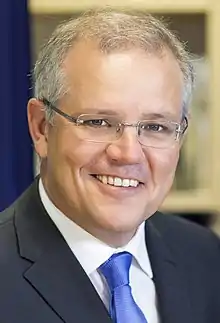Prime Minister of Australia
The prime minister of Australia is the head of government of Australia. The prime minister is the leader of the federal government and is also accountable to federal parliament under the principles of responsible government. The incumbent prime minister is Scott Morrison, who took office in August 2018 as leader of the Liberal Party.
| Prime Minister of Australia | |
|---|---|
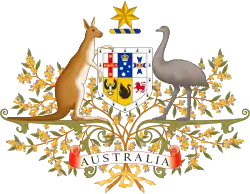 | |
.svg.png.webp) | |
| Department of the Prime Minister and Cabinet | |
| Style | The Honourable[1] |
| Status | Head of government |
| Abbreviation | PM |
| Member of | |
| Reports to | House of Representatives |
| Residence | The Lodge, Canberra[2] Kirribilli House, Sydney[2] |
| Seat | Canberra |
| Appointer | Governor-general[3] on the ability to command the confidence of the House of Representatives |
| Term length | At the Governor-General's pleasure The holder is required to command the confidence of the House of Representatives[4] |
| Constituting instrument | None (constitutional convention) |
| Formation | 1 January 1901 (federation)[3] |
| First holder | Edmund Barton[3] |
| Deputy | Deputy prime minister |
| Salary | A$549,250[5] |
| Website | pm |
Formally appointed by the governor-general, the office of the prime minister is governed by Westminster system convention as it is not described in the Australian constitution. To become prime minister, a politician of the House of Representatives must be able to command the confidence of the chamber. As such, the prime minister is typically the leader of the majority party or coalition. Prime ministers do not have a set duration or number of terms, but an individual's term generally ends when their political party loses a federal election, or they lose or relinquish the leadership of their party.
Executive power is formally vested in the monarch and exercised by the governor-general on advice from government ministers, who are nominated by the prime minister and form the Federal Executive Council. The most senior ministers form the federal cabinet, which the prime minister chairs. The prime minister also heads the National Cabinet and the National Security Committee. Administrative support is provided by the Department of the Prime Minister and Cabinet. The prime minister has two official residences: The Lodge in Canberra and Kirribilli House in Sydney, as well as an office at Parliament House.
Thirty people have served as prime minister, the first of whom was Edmund Barton taking office on 1 January 1901 following federation. The longest-serving prime minister was Robert Menzies, who served over 18 years, and the short-serving was Frank Forde, who served one week. There is no legislative line of succession, however convention determines that the governor-general shall commission the deputy prime minister on a caretaker basis.
Constitutional basis and appointment
 |
|---|
| This article is part of a series on the politics and government of Australia |
| Constitution |
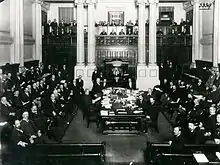
The prime minister of Australia is appointed by the governor-general of Australia under Section 64 of the Australian Constitution, which empowers the governor-general, as the official representative of the Crown, to appoint government ministers of state on the advice of the Federal Executive Council, and requires them to be members of the House of Representatives or the Senate, or become members within three months of the appointment. The prime minister and treasurer are traditionally members of the House, but the Constitution does not have such a requirement.[6] Before being sworn in as a Minister of State, a person must first be sworn in as a member of the Federal Executive Council if they are not already a member. Membership of the Federal Executive Council entitles the member to the style of The Honourable (usually abbreviated to The Hon) for life, barring exceptional circumstances. The senior members of the Executive Council constitute the Cabinet of Australia.
The prime minister is, like other ministers, normally sworn in by the governor-general and then presented with the commission (letters patent) of office. When defeated in an election, or on resigning, the prime minister is said to "hand in the commission" and actually does so by returning it to the governor-general. In the event of a prime minister dying in office, or becoming incapacitated, or for other reasons, the governor-general can terminate the commission. Ministers hold office "during the pleasure of the governor-general" (s. 64 of the Constitution of Australia), so theoretically, the governor-general can dismiss a minister at any time, by notifying them in writing of the termination of their commission; however, their power to do so except on the advice of the prime minister is heavily circumscribed by convention.
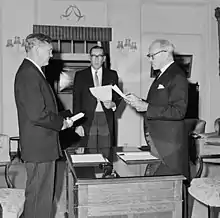
According to convention, the prime minister is the leader of the majority party or largest party in a coalition of parties in the House of Representatives which holds the confidence of the House. Some commentators argue that the governor-general may also dismiss a prime minister who is unable to pass the government's supply bill through both houses of parliament, including the Australian Senate, where the government doesn't normally command the majority, as happened in the 1975 constitutional crisis.[7] Other commentators argue that the governor-general acted improperly in 1975 as Whitlam still retained the confidence of the House of Representatives, and there are no generally accepted conventions to guide the use of the governor-general's reserve powers in this circumstance.[8] However, there is no constitutional requirement that the prime minister sit in the House of Representatives, or even be a member of the federal parliament (subject to a constitutionally prescribed limit of three months), though by convention this is always the case. The only case where a member of the Senate was appointed Prime Minister was John Gorton, who subsequently resigned his Senate position and was elected as the member for Higgins in the House of Representatives.
Despite the importance of the office of Prime Minister, the Constitution does not mention the office by name. The conventions of the Westminster system were thought to be sufficiently entrenched in Australia by the authors of the Constitution that it was deemed unnecessary to detail these. Indeed, prior to Federation in 1901 the terms "premier" and "prime minister" were used interchangeably for the head of government in a colony.[9]
If a government cannot get its appropriation (budget) legislation passed by the House of Representatives, or the House passes a vote of "no confidence" in the government, the prime minister is bound by convention to immediately advise the governor-general to dissolve the House of Representatives and hold a fresh election.
Following a resignation in other circumstances or the death of a prime minister, the governor-general generally appoints the deputy prime minister as the new prime minister, until or if such time as the governing party or senior coalition party elects an alternative party leader. This has resulted in the party leaders from the Country Party (now named National Party) being appointed as Prime Minister, despite being the smaller party of their coalition. This occurred when Earle Page became caretaker prime minister following the death of Joseph Lyons in 1939, and when John McEwen became caretaker prime minister following the disappearance of Harold Holt in 1967. However, in 1941, Arthur Fadden became the leader of the Coalition and subsequently Prime Minister by the agreement of both coalition parties, despite being the leader of the smaller party in coalition, following the resignation of UAP leader Robert Menzies.
Excluding the brief transition periods during changes of government or leadership elections, there have only been a handful of cases where someone other than the leader of the majority party in the House of Representatives was Prime Minister:
- Federation occurred on 1 January 1901, but elections for the first parliament were not scheduled until late March. In the interim, an unelected caretaker government was necessary. In what is now known as the Hopetoun Blunder, the governor-general, Lord Hopetoun, invited Sir William Lyne, the premier of the most populous state, New South Wales, to form a government. Lyne was unable to do so and returned his commission in favour of Edmund Barton, who became the first prime minister and led the inaugural government into and beyond the election.
- During the second parliament, three parties (Free Trade, Protectionist and Labor) had roughly equal representation in the House of Representatives. The leaders of the three parties, Alfred Deakin, George Reid and Chris Watson each served as Prime Minister before losing a vote of confidence.
- As a result of the Labor Party's split over conscription, Billy Hughes and his supporters were expelled from the Labor Party in November 1916. He subsequently continued on as prime minister at the head of the new National Labor Party, which had only 14 members out of a total of 75 in the House of Representatives. The Commonwealth Liberal Party – despite still forming the official Opposition – provided confidence and supply until February 1917, when the two parties agree to merge and form the Nationalist Party.
- During the 1975 constitutional crisis, on 11 November 1975, the governor-general, Sir John Kerr, dismissed the Labor Party's Gough Whitlam as Prime Minister. Despite Labor holding a majority in the House of Representatives, Kerr appointed the Leader of the Opposition, Liberal leader Malcolm Fraser as caretaker prime minister, conditional on the passage of the Whitlam government's Supply bills through the Senate and the calling of an election for both houses of parliament. Fraser accepted these terms and immediately advised a double dissolution. An election was called for 13 December, which the Liberal Party won in its own right (although the Liberals governed in a coalition with the Country Party).
Powers and role
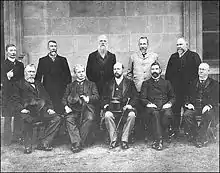
Most of the prime minister's power derives from being the head of government.[10] In practice, the Federal Executive Council acts to ratify all executive decisions made by the government and requires the support of the prime minister. The powers of the prime minister are to direct the governor-general through advice to grant Royal Assent to legislation, to dissolve and prorogue parliament, to call elections and to make government appointments, which the governor-general follows.
The Constitution divides power between the federal government and the states, and the prime minister is constrained by this.[11]
The formal power to appoint the governor-general lies with the Queen of Australia, on the advice of the prime minister, whereby convention holds that the queen is bound to follow the advice. The prime minister can also advise the monarch to dismiss the governor-general, though it remains unclear how quickly the monarch would act on such advice in a constitutional crisis. This uncertainty, and the possibility of a "race" between the governor-general and prime minister to dismiss the other, was a key question in the 1975 constitutional crisis. Prime ministers whose government loses a vote of no-confidence in the House of Representatives, are expected to advise the governor-general to dissolve parliament and hold an election, if an alternative government cannot be formed. If they fail to do this, the governor-general may by convention dissolve parliament or appoint an alternative government.[7]
The prime minister is also the responsible minister for the Department of the Prime Minister and Cabinet, which is tasked with supporting the policy agendas of the prime minister and Cabinet through policy advice and the coordination of the implementation of key government programs, to manage Aboriginal and Torres Strait Islander policy and programs and to promote reconciliation, to provide leadership for the Australian Public Service alongside the Australian Public Service Commission, to oversee the honours and symbols of the Commonwealth, to provide support to ceremonies and official visits, to set whole of government service delivery policy, and to coordinate national security, cyber, counterterrorism, regulatory reform, cities, population, data, and women's policy.[12] Since 1992, the prime minister also acts as the chair of the Council of Australian Governments (COAG), an intergovernmental forum between the federal government and the state governments in which the prime minister, the state premiers and chief ministers, and a representative of local governments meet annually.[13]
Privileges of office
Salary
| Effective date | Salary | Ref. |
|---|---|---|
| 2 June 1999 | $289,270 | |
| 6 September 2006 | $309,270 | |
| 1 July 2007 | $330,356 | |
| 1 October 2009 | $340,704 | [14] |
| 1 August 2010 | $354,671 | [15] |
| 1 July 2011 | $366,366 | |
| 1 December 2011 | $440,000 | |
| 15 March 2012 | $481,000 | [16] |
| 1 July 2012 | $495,430 | [17] |
| 1 July 2013 | $507,338 | [18] |
| 1 January 2016 | $517,504 | [19] |
| 1 July 2017 | $527,852 | [20] |
| 1 July 2018 | $538,460 | [21] |
| 1 July 2019 | $549,250 | [21] |
As of 1 July 2019, Australia's prime minister is paid a total salary of $549,250. This is made up of the 'base salary' received by all Members of Parliament ($211,250) plus a 160 percent 'additional salary' for the role of prime minister.[22] Increases in the base salary of MPs and senators are determined annually by the independent Remuneration Tribunal.[21]
Residences and transport
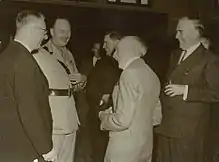
While in office, the prime minister has two official residences. The primary official residence is The Lodge in Canberra. Most prime ministers have chosen The Lodge as their primary residence because of its security facilities and close proximity to Parliament House. There have been some exceptions, however. James Scullin preferred to live at the Hotel Canberra (now the Hyatt Hotel) and Ben Chifley lived in the Hotel Kurrajong. More recently, John Howard used the Sydney Prime Ministerial residence, Kirribilli House, as his primary accommodation. On her appointment on 24 June 2010, Julia Gillard said she would not be living in The Lodge until such time as she was returned to office by popular vote at the next general election, as she became Prime Minister by replacing an incumbent during a parliamentary term. Tony Abbott was never able to occupy The Lodge during his term (2013–15) as it was undergoing extensive renovations, which continued into the early part of his successor Malcolm Turnbull's term.[23] Instead, Abbott resided in dedicated rooms at the Australian Federal Police College when in Canberra.
During his first term, Rudd had a staff at The Lodge consisting of a senior chef and an assistant chef, a child carer, one senior house attendant, and two junior house attendants. At Kirribilli House in Sydney, there is one full-time chef and one full-time house attendant.[24] The official residences are fully staffed and catered for both the prime minister and their family. In addition, both have extensive security facilities. These residences are regularly used for official entertaining, such as receptions for Australian of the Year finalists.
The prime minister receives a number of transport amenities for official business. The Royal Australian Air Force's No. 34 Squadron transports the prime minister within Australia and overseas by specially converted Boeing Business Jets and smaller Challenger aircraft. The aircraft contain secure communications equipment as well as an office, conference room and sleeping compartments. The call-sign for the aircraft is "Envoy". For ground travel, the prime minister is transported in an armoured BMW 7 Series model. It is referred to as "C-1", or Commonwealth One, because of its number plate. It is escorted by police vehicles from state and federal authorities.[25]
- Privileges of office
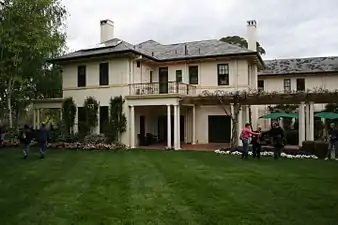
Kirribilli_House_Kirribilli.jpg.webp)
_%E2%80%93_Frontansicht%252C_7._Mai_2011%252C_D%C3%BCsseldorf.jpg.webp)
_CBR_Gilbert-1.jpg.webp)
After office
Politicians, including prime ministers, are usually granted certain privileges after leaving office, such as office accommodation, staff assistance, and a Life Gold Pass, which entitles the holder to travel within Australia for "non-commercial" purposes at government expense. In 2017, Prime Minister Malcolm Turnbull said the pass should be available only to former prime ministers, though he would not use it when he was no longer PM.[26]
Only one prime minister who had left the Federal Parliament ever returned. Stanley Bruce was defeated in his own seat in 1929 while Prime Minister but was re-elected to parliament in 1931. Other prime ministers were elected to parliaments other than the Australian federal parliament: Sir George Reid was elected to the UK House of Commons (after his term as High Commissioner to the UK), and Frank Forde was re-elected to the Queensland Parliament (after his term as High Commissioner to Canada, and a failed attempt to re-enter the Federal Parliament).
Acting prime minister
It is a convention for the deputy prime minister to serve as acting prime minister when the prime minister is travelling outside Australia or absent due to illness. If the deputy prime minister is also unavailable, another senior member of the government is appointed as acting prime minister.[27] If a prime minister is to die, disappear, or otherwise become permanently unable to act as the prime minister while in office, the governor-general, by convention, shall commission the deputy prime minister to be prime minister until the House of Representatives can determine another politician who can command the confidence of the chamber.[28]
The Acts Interpretation Act 1901 confers upon acting ministers "the same power and authority with respect to the absent Minister's statutory responsibilities".[29]
In the early 20th century, overseas travel generally required long journeys by ship. As a result, some held the position of acting prime minister for significant periods of time, including William Watt (16 months, 1918–1919),[30] George Pearce (7 months, 1916),[31] Alfred Deakin (6 months, 1902),[32] Joseph Cook (5 months, 1921),[33] James Fenton (19 weeks, 1930–1931),[34] John Forrest (4 months, 1907),[35] and Arthur Fadden (4 months, 1941). Fadden was acting prime minister for a cumulative total of 676 days (over 22 months) between 1941 and 1958.[36]
Former prime ministers
As of February 2021, there are six living former Australian prime ministers.[37]
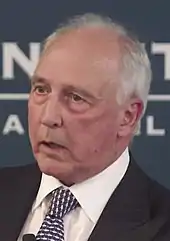 |
.jpg.webp) |
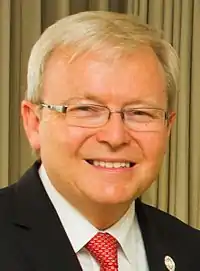 |
_(cropped).jpg.webp) |
.jpg.webp) |
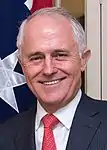 |
The greatest number of living former prime ministers at any one time was eight. This has occurred twice:
- Between 7 October 1941 (when John Curtin succeeded Arthur Fadden) and 18 November 1941 (when Chris Watson died), the eight living former prime ministers were Bruce, Cook, Fadden, Hughes, Menzies, Page, Scullin and Watson.
- Between 13 July 1945 (when Ben Chifley succeeded Frank Forde) and 30 July 1947 (when Sir Joseph Cook died), the eight living former prime ministers were Bruce, Cook, Fadden, Forde, Hughes, Menzies, Page and Scullin.
All except Cook and Bruce, as former Prime Ministers served in Parliament at the same time between Chifley succeeding Forde on 13 July 1945 and Forde losing his seat at the 1946 election. This marks the greatest number (six) of former prime ministers serving in Parliament concurrently at any one time.
Ben Chifley lived the least of all former prime ministers, as he died one year and six months after his term as prime minister.[38] All other deceased former prime ministers have lived at least another 10 years, with the longest surviving former prime minister being Gough Whitlam, who lived 38 years and 11 months after office, surpassing Stanley Bruce's previous record of 37 years and 10 months.[39]
Ages
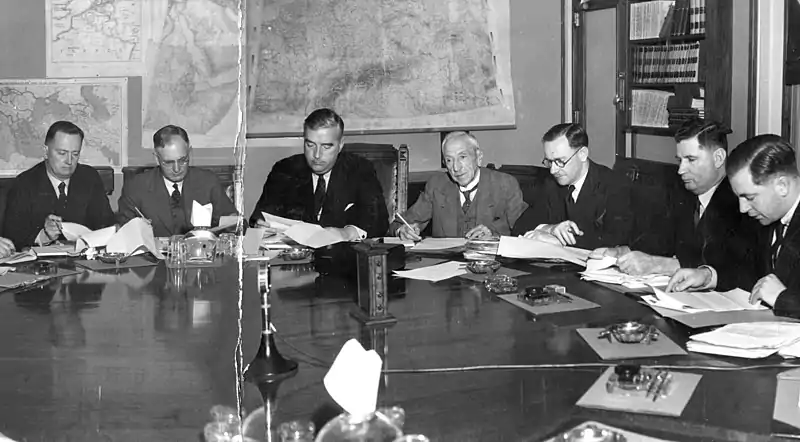
The youngest person to become prime minister was Chris Watson – 37,[40] who was also 37 when he ceased being prime minister. The oldest person to become prime minister was John McEwen – 67 as an interim prime minister,[41] otherwise William McMahon – 63.[42] Robert Menzies was the oldest person to ever be prime minister, leaving office at 71 years old.[43]
Honours
Prime Ministers have been granted numerous honours, typically after their period as Prime Minister has concluded, with a few exceptions. Prime Ministers were awarded honours within the British honours system before 1975, when appointment to the Order of Australia began. Only one former Prime Minister, John Howard, has been awarded a British Honour since 1975, being the Order of Merit (within the Queen's personal gift) in 2012.[44]
Nine former Prime Ministers were awarded knighthoods: Barton (GCMG, 1902),[45] Reid (GCMG, 1911),[46] Cook (GCMG, 1918),[47] Page (GCMG, 1938),[48] Menzies (KT, 1963),[49] Fadden (KCMG, 1951),[50] McEwen (GCMG, 1971),[51] Gorton (GCMG, 1977),[52] and McMahon (GCMG, 1977).[53] Of those awarded, Barton and Menzies were knighted whilst still serving as Prime Minister, with Page awarded his before becoming Prime Minister, and the remainder awarded after leaving office. Reid (GCB, 1916),[54] Menzies (AK, 1976)[55] and Fadden (GCMG, 1958)[56] were awarded a second knighthood after leaving office.
Non-titular honours were also bestowed on former Prime Ministers, usually the Order of the Companions of Honour. This honour was awarded to Bruce (1927),[57] Lyons (1936),[58] Hughes (1941),[59] Page (1942),[60] Menzies (1951),[61] Holt (1967),[62] McEwen (1969),[63] Gorton (1971),[64] McMahon (1972),[65] and Fraser (1977),[66] mostly during office as Prime Minister. John Howard was appointed to the Order of Merit in 2012.
In almost all occasions these honours were only accepted by non-Labor/conservative Prime Ministers. However, appointment to the Privy Council of the United Kingdom was accepted by all Prime Ministers until 1983 (with the exception of Alfred Deakin, Chris Watson and Gough Whitlam), with Malcolm Fraser being the last Prime Ministerial appointee.
Since its introduction in 1975, former Prime Ministers of Australia have been appointed to the Order of Australia and to its highest level – Companion: Whitlam (1978),[67] Fraser (1988),[68] Gorton (1988),[69] Howard (2008),[70] Gillard (2017),[71] Rudd (2019),[72] Abbott (2020),[73] and Turnbull (2021).[74] Keating refused appointment in 1997.[75] Bob Hawke was appointed a Companion in 1979, for service to trade unionism and industrial relations, before becoming Prime Minister in 1983.[76] Menzies was appointed to the higher grade of Knight of the Order, which is no longer awarded, in 1976.
In addition to these honours, all deceased former Prime Ministers of Australia currently have federal electorates named after them, with the exceptions of Joseph Cook (a Division of Cook does exist, but it is only named after explorer James Cook) and the recently deceased Bob Hawke.
List
- For further detail see:
- List of Prime Ministers of Australia (graphical)
- List of Prime Ministers of Australia by state
- List of prime ministers of Australia by time in office
- List of Prime Ministers of Australia by age
The longest-serving prime minister was Sir Robert Menzies, who served in office twice: from 26 April 1939 to 28 August 1941, and again from 19 December 1949 to 26 January 1966. In total Robert Menzies spent 18 years, 5 months and 12 days in office. He served under the United Australia Party and the Liberal Party respectively.
The shortest-serving prime minister was Frank Forde, who was appointed to the position on 6 July 1945 after the death of John Curtin, and served until 13 July 1945 when Ben Chifley was elected leader of the Australian Labor Party.
The last prime minister to serve out a full government term in the office was John Howard, who won the 2004 election and led his party to the 2007 election, but lost. Since then, the five subsequent prime ministers have been either voted out of the office mid-term by the caucuses of their own parties, assumed the office mid-term under such circumstances, or both.
See also
- Historical rankings of Prime Ministers of Australia
- List of Australian Leaders of the Opposition
- List of Commonwealth heads of government
- List of Prime Ministers of Australia
- List of Prime Ministers of Australia (graphical)
- List of Prime Ministers of Australia by age
- List of prime ministers of Elizabeth II
- Prime Ministers Avenue in Horse Chestnut Avenue in the Ballarat Botanical Gardens contains a collection of bronze busts of former Australian prime ministers.
- Prime Minister's XI
- Spouse of the Prime Minister of Australia
References
- "Contact Your PM". Prime Minister of Australia. Retrieved 29 May 2020.
- "Prime Minister". Parliamentary Education Office. Retrieved 29 May 2020.
- "Prime Ministers". Australian Prime Ministers Centre, Old Parliament House. Retrieved 29 May 2020.
- "Prime Minister". Parliamentary Education Office. Retrieved 29 May 2020.
- "Salary". Ministerial and Parliamentary Services, Department of Finance. 3 February 2020. Retrieved 29 May 2020.
- "No. 14 - Ministers in the Senate". Senate Briefs. Parliament of Australia. December 2016.
- Kerr, John. "Statement from John Kerr (dated 11 November 1975) explaining his decisions". WhitlamDismissal.com. Archived from the original on 23 February 2012. Retrieved 11 January 2017.
- Australia's Constitution : With Overview and Notes by the Australian Government Solicitor (Pocket ed.). Canberra: Parliamentary Education Office and Australian Government Solicitor. 2010. p. v. ISBN 9781742293431.
- "The Premiers' Conference - Text of the Resolutions". The Age. 23 August 1898. Retrieved 5 December 2019.
- "Infosheet 20 - The Australian system of government". Parliament of Australia. Retrieved 30 July 2020.
- "Prime Minister: Roles, Powers and Restraints". Australian Politics.
- "Administrative Arrangements Order". Department of the Prime Minister and Cabinet. Commonwealth of Australia. 1 September 2016. Retrieved 11 January 2017.
- https://www.coag.gov.au/about-coag
- "Prime Minister Kevin Rudd and MPs in line to get a 3% pay rise".
- Hudson, Phillip (25 August 2010). "Politicians awarded secret pay rise". Herald Sun. Australia.
- Archived 13 April 2013 at the Wayback Machine
- "Tony Abbott defends increase in MP salary, saying he's working hard for every Australian". Herald Sun. 5 July 2012.
- Peatling, Stephanie (14 June 2013). "PM's salary tops $500,000". The Sydney Morning Herald.
- Mannheim, Markus (10 December 2015). "Politicians, judges and top public servants to gain 2% pay rise after wage freeze". The Canberra Times.
- "Politicians under fire for pay increases while penalty rates cut, One Nation wants to reject rise". 23 June 2017.
- "What do Federal Members of Parliament get paid?". Remuneration Tribunal. Retrieved 21 January 2019.
- "Parliamentary Offices". Remuneration Tribunal. Retrieved 2 July 2019.
- Canberra Times, 18 August 2017. Retrieved 12 June 2018
- Metherell, Mark (19 February 2008). "Rudds' staff extends to a child carer at the Lodge". The Sydney Morning Herald. Retrieved 24 June 2010.
- CarAdvice.com.au (6 April 2009). "25% of government car fleet foreign made". Car Advice. Retrieved 12 December 2011.
- Hutchens, Gareth (7 February 2017). "Malcolm Turnbull to scrap Life Gold Pass for former MPs". the Guardian.
- "Does Australia have a parliamentary line of succession to the Prime Minister and if so, what is the order?". Parliamentary Education Office. Retrieved 16 December 2019.
- ""Does Australia have a parliamentary line of succession to the Prime Minister and if so, what is the order?"". Parliamentary Education Office. Retrieved 23 August 2020.
- "The Ministry". House of Representatives Practice (7th ed.). Parliament of Australia. Retrieved 16 December 2019.
- "Watt, William Alexander (1871–1946)". Australian Dictionary of Biography. 12. 1990.
- Beddie, B. (1988). "Pearce, Sir George Foster (1870–1952)". Australian Dictionary of Biography. 11.
- Norris, R. (1981). "Deakin, Alfred (1856–1919)". Australian Dictionary of Biography. Melbourne University Press. ISSN 1833-7538 – via National Centre of Biography, Australian National University.
- Crowley, F.K. "Cook, Sir Joseph (1860–1947)". Australian Dictionary of Biography. Australian National University. Retrieved 24 April 2016.
- Robertson, J. R. (1981). "Fenton, James Edward (1864–1950)". Australian Dictionary of Biography. 8.
- Crowley, Frank. "Forrest, Sir John (1847–1918)". Australian Dictionary of Biography.
- Arklay, Tracey M. (2010). Arthur Fadden: A Political Silhouette (PDF) (PhD thesis). Griffith University. p. 196.
- Cox, Lisa. "The 'special moment' seven surviving Prime Ministers were photographed together".
- "After office". naa.gov.au.
- "Prime Minister of Australia". Australian Policy Online. Archived from the original on 17 September 2015.
- Nairn, Bede (1990). "Watson, John Christian (1867–1941)". Australian Dictionary of Biography. Melbourne University Press. ISSN 1833-7538. Retrieved 21 October 2008 – via National Centre of Biography, Australian National University.
- "McEwen, Sir John (1900–1980)". Australian Dictionary of Biography.
- "McMahon, Sir William (Billy) (1908–1988)". Australian Dictionary of Biography.
- Martin, A. W. "Menzies, Sir Robert Gordon (Bob) (1894–1978)". Australian Dictionary of Biography. Melbourne University Press. ISSN 1833-7538. Retrieved 22 November 2008 – via National Centre of Biography, Australian National University.
- "No. 60028". The London Gazette. 12 January 2012. p. 485.
- "No. 27448". The London Gazette (Supplement). 26 June 1902. pp. 4189–4196.
- "GCMG". Department of Prime Minister and Cabinet.
- "No. 30831". The London Gazette (Supplement). 6 August 1918. p. 9264.
- "GCMG". Department of Prime Minister and Cabinet.
- "KT". Department of Prime Minister and Cabinet.
- It's an Honour - Fadden KCMG Archived 2 October 2008[Date mismatch] at the Wayback Machine
- "GCMG". Department of Prime Minister and Cabinet.
- It's an Honour Archived 26 May 2011 at the Wayback Machine – Knight Grand Cross of the Order of St Michael and St George
- "It's an Honour – GCMG". Itsanhonour.gov.au. 12 June 1977. Archived from the original on 26 May 2011. Retrieved 25 April 2010.
- "GCB". Department of Prime Minister and Cabinet.
- "AK". Department of Prime Minister and Cabinet.
- "GCMG". Department of Prime Minister and Cabinet.
- "CH". Department of Prime Minister and Cabinet.
- "Mr Joseph Aloysius LYONS". It's An Honour. Department of the Prime Minister and Cabinet. Retrieved 2 April 2019.
- "It's an Honour". Archived from the original on 13 November 2013. Retrieved 4 January 2012.
- "It's an Honour – CH". Itsanhonour.gov.au. 26 June 1942. Archived from the original on 9 November 2018. Retrieved 4 November 2011.
- "It's an Honour: CH". Australian Government. Archived from the original on 4 June 2011. Retrieved 15 October 2009.
- "CH". Department of Prime Minister and Cabinet.
- "CH". Department of Prime Minister and Cabinet.
- "CH". Department of Prime Minister and Cabinet.
- "CH". Department of Prime Minister and Cabinet.
- "CH". Department of Prime Minister and Cabinet.
- "AC". Department of Prime Minister and Cabinet.
- "AC". Department of Prime Minister and Cabinet.
- It's an Honour Archived 26 May 2011 at the Wayback Machine – Companion of the Order of Australia
- It's an Honour: AC, Australian Government, 9 June 2008, archived from the original on 21 September 2016, retrieved 20 June 2017
- "It's an Honour: AC", Itsanhonour.gov.au, Government of Australia, 26 January 2017, retrieved 26 January 2017
- "AC". Department of Prime Minister and Cabinet.
- Queen's Birthday Honours 2020 (PDF), Governor General, retrieved 7 June 2020
- Australia Day Honours 2021, Governor General, retrieved 29 January 2021
- "After office". Australia's PMs – Paul Keating. National Archives of Australia. Retrieved 15 July 2010.
- "It's an Honour". Government of Australia. Retrieved 3 September 2007.
Further reading
- Abjorensen, Norman (2015). The Manner of Their Going: Prime Ministerial Exits from Lyne to Abbott. Australian Scholarly. ISBN 9781925333213.
- Grattan, Michelle (2016). Australian Prime Ministers. New Holland. ISBN 9781742579337.
- Hughes, Colin (1976). Mr Prime Minister: Australian Prime Ministers 1901–1972. Oxford University Press. ISBN 0195504712.
- Strangio, Paul (2013). "Evaluating Prime-Ministerial Performance: The Australian Experience". In Strangio, Paul; 't Hart, Paul; Walter, James (eds.). Understanding Prime-Ministerial Performance: Comparative Perspectives. Oxford University Press. ISBN 9780199666423.
- Strangio, Paul; 't Hart, Paul; Walter, James (2016). Settling the Office: The Australian Prime Ministership from Federation to Reconstruction. Melbourne University Press. ISBN 9780522868722.
- Strangio, Paul; 't Hart, Paul; Walter, James (2017). The Pivot of Power: Australian Prime Ministers and Political Leadership, 1949-2016. Melbourne University Press. ISBN 9780522868746.
- Whitington, Don (1972). Twelfth Man?. Jacaranda Press. ISBN 0701605855.
External links
| Wikimedia Commons has media related to Prime Ministers of Australia. |
| Library resources about Prime Minister of Australia |
- Official website of the prime minister of Australia
- Department of Prime Minister and Cabinet
- Australia's Prime Ministers – National Archives of Australia reference site and research portal
- Biographies of Australia's Prime Ministers / National Museum of Australia
- Classroom resources on Australian Prime Ministers
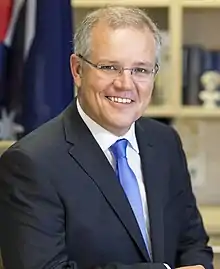
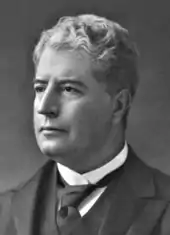
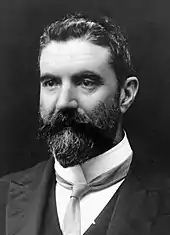
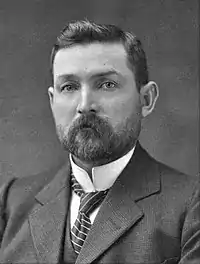
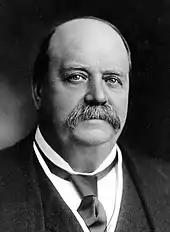
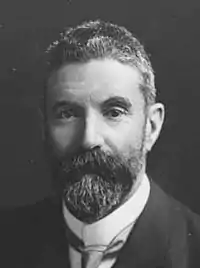
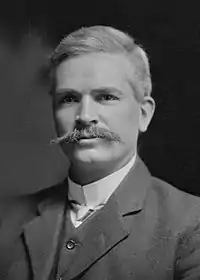
.tif.png.webp)
.jpg.webp)
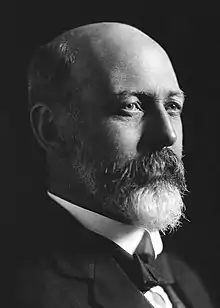
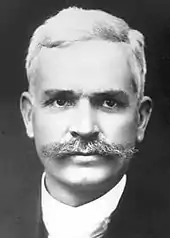
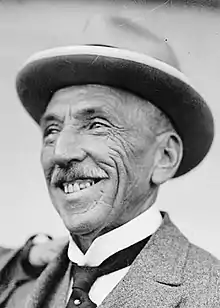
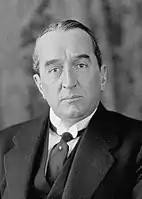
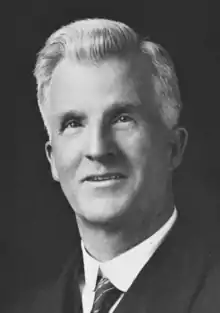
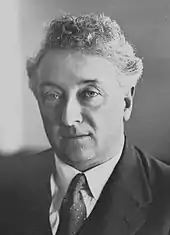
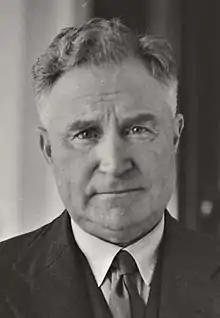
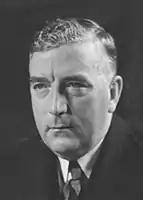
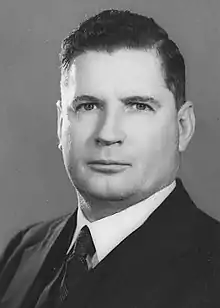
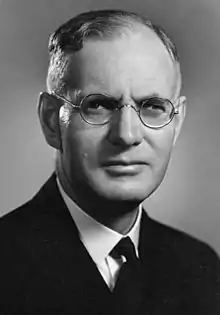
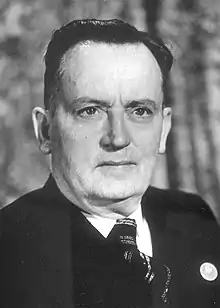
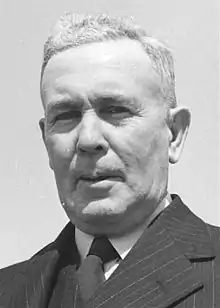
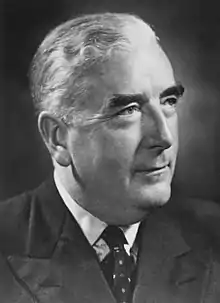
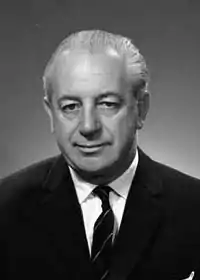
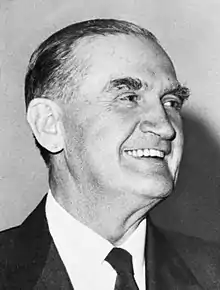
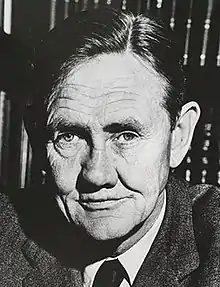
.jpg.webp)
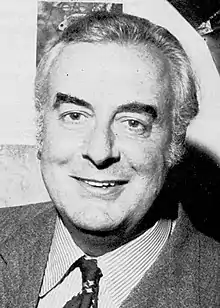
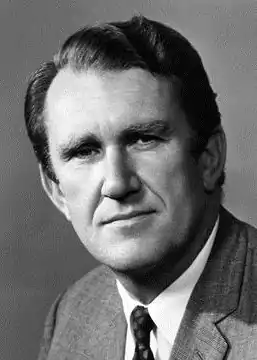
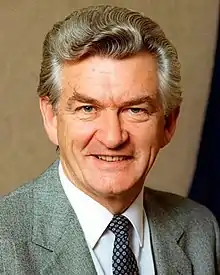
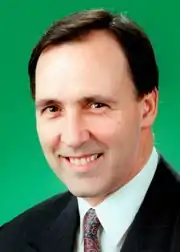
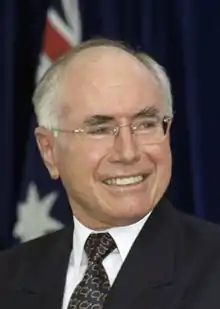
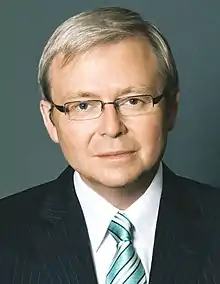
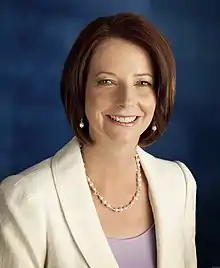
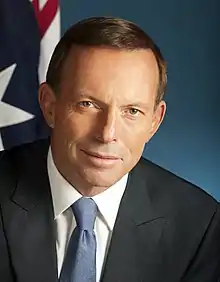
.jpg.webp)
